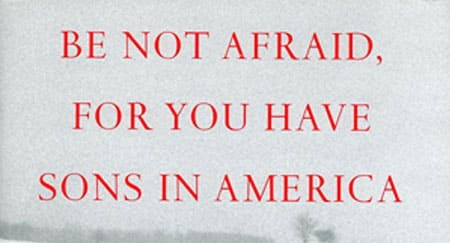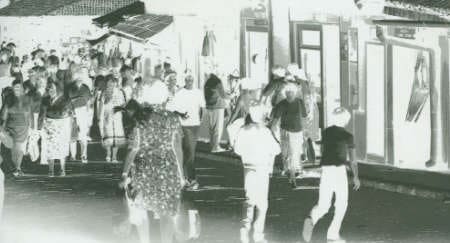Thomas Yde reviews two recent books examining the role of Balkan émigrés in the wars of Yugoslavia's dissolution.
Be not Afraid for you have Sons in America, How a Brooklyn Roofer Helped Lure the US into the Kosovo War, Stacy Sullivan, St. Martin's Press, New York, 2004.
Homeland Calling, Exile Patriotism and the Balkan Wars, Paul Hockenos, Cornell University Press, Ithaca and London, 2003.
What fuelled the bloody ethnic conflicts that tore Yugoslavia apart and brought about the immense human suffering that marred the Balkans throughout the 1990s and continues to cast dark clouds over the region today? This question has been discussed intensely since the early 1990s and remains hotly debated today. Indeed, it has been the focus of much excellent writing over the past ten years as well as the topic of innumerable reports and high-level conferences. Some analysts have suggested, in line with the accepted wisdom, that the answer lies in innate ethnic hatred between the different ethnic groups inhabiting former Yugoslavia bred by centuries of conflict and reinforced by the deep socio-economic cleavages between the comparatively prosperous north of the country and the poorer south. This hatred, it is argued, was controlled - but never eliminated - under Tito's charismatic leadership with the result that it was bound to resurface following his death.
Other commentators have emphasised the critical role played by leaders such as Slobodan Milosevic and Franjo Tudjman in stirring nationalist sentiments as a ploy to consolidate their power. In this view, the radical nationalism characterising the Balkan wars was not inevitable, but the effect of well-calibrated, calculated campaigns of misinformation and propaganda that deliberately distorted historical events to sow fear and hatred to suit various political ends. Milosevic's speech on the Field of Blackbirds in June 1989 marking the 600th anniversary of the Battle of Kosovo Polje, for example, can be seen as a deliberate attempt to rally domestic support within Serbia by sparking ethnic conflict between Kosovo Albanians and Serbs.
What unites both explanations is a belief that the factors fuelling the Balkan wars lie mainly within Yugoslavia. What has been somewhat absent in the debate so far is consideration of external factors in stimulating the violent conflicts that tore Yugoslavia apart. The role played by diaspora, for example, remains understudied. To be sure, the power and influence of émigrés in Australia, Canada, Europe, South America and the United States has figured in studies such as Mary Kaldor's Old and New Wars, Organized Violence in a Global Era (Polity, 1999). However, the impact of "long-distance nationalism" has rarely been treated as a crucial factor in its own right in analyses of the Balkans wars. This probably results from the difficulties and dangers in uncovering the shadowy world in which the radical nationalist elements of diaspora communities operate.
As a result, Stacy Sullivan's Be not Afraid for you have Sons in America, How a Brooklyn Roofer Helped Lure the US into the Kosovo War (St. Martin's Press, New York, 2004) and Paul Hockenos' Homeland Calling, Exile Patriotism and the Balkan Wars (Cornell University Press, Ithaca and London, 2003) are significant contributions to our understanding of the Balkan wars. Both books offer detailed and balanced accounts of the link between émigré nationalism and the violent disintegration of Yugoslavia. And they reveal the extent of the impact of émigré activism in bolstering radical nationalist forces in their home countries by providing the political ideologies, the funds, and often the supplies of weapons and equipment that fuelled the conflicts.
Sullivan's book is an insider's account of the Kosovo War. The book offers a disturbing glimpse into the underworld in which Sullivan worked as a journalist for almost two years - a world of revolutionaries, gangsters, wannabe politicians, arms dealers, war profiteers, and frightened, impoverished Kosovo Albanian villagers. It reveals how an Albanian immigrant in the United States, a Brooklyn roofer by the name of Florin Krasniqi, helped launch a guerrilla army, whose actions ultimately helped persuade the United States and its NATO Allies to launch a humanitarian intervention in Kosovo. Florin not only raised much of the Kosovo Liberation Army's funds through the Homeland Calling Fund, but also helped supply the bulk of its military hardware. Florin also wielded some influence over US decision-making through the Albanian lobby in Washington and even arranged for an Atlantic Brigade of North American volunteers to join the fight in their homeland.
Sullivan's work is worth reading for a number of reasons. Above all, it is an important eyewitness account of the events that took place behind the scenes of the Kosovo War. It is valuable as a primary source of evidence documenting how Albanians living in the United States funded and supplied the Kosovo Liberation Army. And it reads well, elegantly integrating Florin's story with a thorough and entertaining history of Kosovo, which covers both recent developments and traces their root causes in a comprehensive manner.
Although the account is highly personal and reveals a great deal of sympathy, warmth and understanding for the main characters of the book, Sullivan is able to keep a critical distance to the events and people she is describing. This is revealed in the opening citation - Friedrich Nietzsche's warning that "He who fights with monsters should look to it that he himself does not become a monster" - a clear reference to Florin, who in reacting to Serb atrocities ultimately succumbs to their brutality. The quote also reflects a more general criticism of Kosovo Albanians, who, blinded by ethnic loyalty, failed to prevent reprisals against Serb civilians after the war. Although Albanians may not have initiated the cycle of violence in Kosovo, their failure to establish law and order and prosecute ethnic kin for atrocities committed against Serbs has ensured that it will not easily be terminated, Sullivan argues. In this light, former Prime Minister Ramush Haradinaj's recent decision to surrender to the International War Crimes Tribunal in The Hague may represent a significant first step towards peace and stability in Kosovo.
Though a compelling tale, the book fails to place the role of émigré communities in a wider analytical context. For instance, it does not address the critical question of why large parts of the Albanian diaspora have been reluctant to adopt the democratic cultures of their adopted countries opting instead for a radical nationalism in direct conflict with some of the core values of democracy. Historical animosities between Albanians and Serbs and the atrocities committed by the Milosevic regime provide only part of the story, but Sullivan does not identify other and more general causes of émigré nationalism. The book also fails to explore the link between the role played by diaspora and the concept of globalisation. Advances in communications and increased exchange of ideas, information, goods and services, and capital flows have clearly facilitated the increased importance of diaspora in fuelling ethnic conflict. Yet, despite frequent references to Florin's use of sophisticated forms of global communication and transnational banking networks, Sullivan refrains from exploring how.
Hockenos' book addresses these and other questions in depth, providing a broader-based analysis of the role played by exile groups and émigré communities in fuelling the Balkan wars of the 1990s. Hockenos argues that although ultimate responsibility for these wars lies with the peoples and political leaders of the Balkans, the Albanian, Croat, and Serb diaspora contributed to the conflicts of the 1990s and only rarely helped bolster democratic forces in their home countries. The Balkan diaspora bankrolled nationalist leaders, put millions of dollars into lobbying campaigns in the United States, helped fund and arm guerrilla armies and even supplied volunteers for the fighting. Hockenos also convincingly demonstrates how many of the ideas, which inspired the virulent strain of nationalism underpinning the political programmes of leaders such as Tudjman and Milosevic, were formulated in exile communities. Indeed, in Croatia, Kosovo and Serbia émigrés returned to take up prominent ministerial positions in nationalist governments.
Hockenos, a writer and political analyst, who has also worked for the Organization for Security and Cooperation in Europe in Bosnia and Herzegovina, traces the propensity for radical nationalism displayed by the politically active elements of the Balkan diaspora back to the experience of being evicted from their homelands following the end of the Second World War. The scars of defeat and expulsion, he argues, fuelled the hatred and regret that characterised the politically oriented émigré organisations and led them to remain wedded to the militant nationalist ideologies of the fascist and royalist movements of the 1930s and 1940s. This also proved to be the case because the diaspora did not experience the decades of coexistence during the Cold War that helped ease tensions and build trust among the different ethnic groups within Yugoslavia. Hence these communities were ill-equipped to advance the democratic cultures of their adopted countries in their homelands following the collapse of Communism.
According to Hockenos, the centrifugal forces of globalisation have exacerbated rather than reduced the nationalist passions of exile communities, partly because of the anonymity and insecurity that globalisation breeds, and partly because increased exchange of information, goods, and capital allows émigrés to remain attached to their homeland. By breaking down the barriers between the homeland and the diaspora, the process of globalisation has increased the influence of "long-distance nationalism" in domestic political processes.
In tracing many of the root causes of the radical nationalism nourished by émigré communities, Hockenos adds significantly to our understanding of the Balkan wars. It would have been nice, however, had he taken the logical next step and analysed how diaspora may be utilised as agents for democratic reform in their homelands. As Hockenos himself recognises, Balkan émigré communities, in addition to their destructive capabilities, have enormous potential to assist the democratic transition of their home countries and help build the foundations of stability and prosperity.
Given the extent of his expertise, it is also a shame that Hockenos does not seek to place the role of Balkan diaspora in a wider historical and cultural context. The book would have benefited from a discussion of the differences and similarities between the émigré nationalism of Balkan diaspora and that of exile communities from other parts of the world during the 19th and 20th centuries. How, for example, was the role played by Balkan diaspora in bringing about the violent demise of Yugoslavia different from those of the Russian and Irish exile communities in fuelling the Russian revolution and the decades of conflict in Northern Ireland respectively? Globalisation is clearly part of the story, but the book would have profited from a more comprehensive treatment of this issue.
All in all, however, the books reviewed deserve much credit. They are eloquently written, entertaining and comprehensive in their treatment of a complex and understudied phenomenon, which played a crucial and decisive role in the violent collapse of Yugoslavia in the 1990s. In contributing to our understanding of émigré nationalism, they also offer a useful tool for avoiding ethnic conflict in the years to come.


